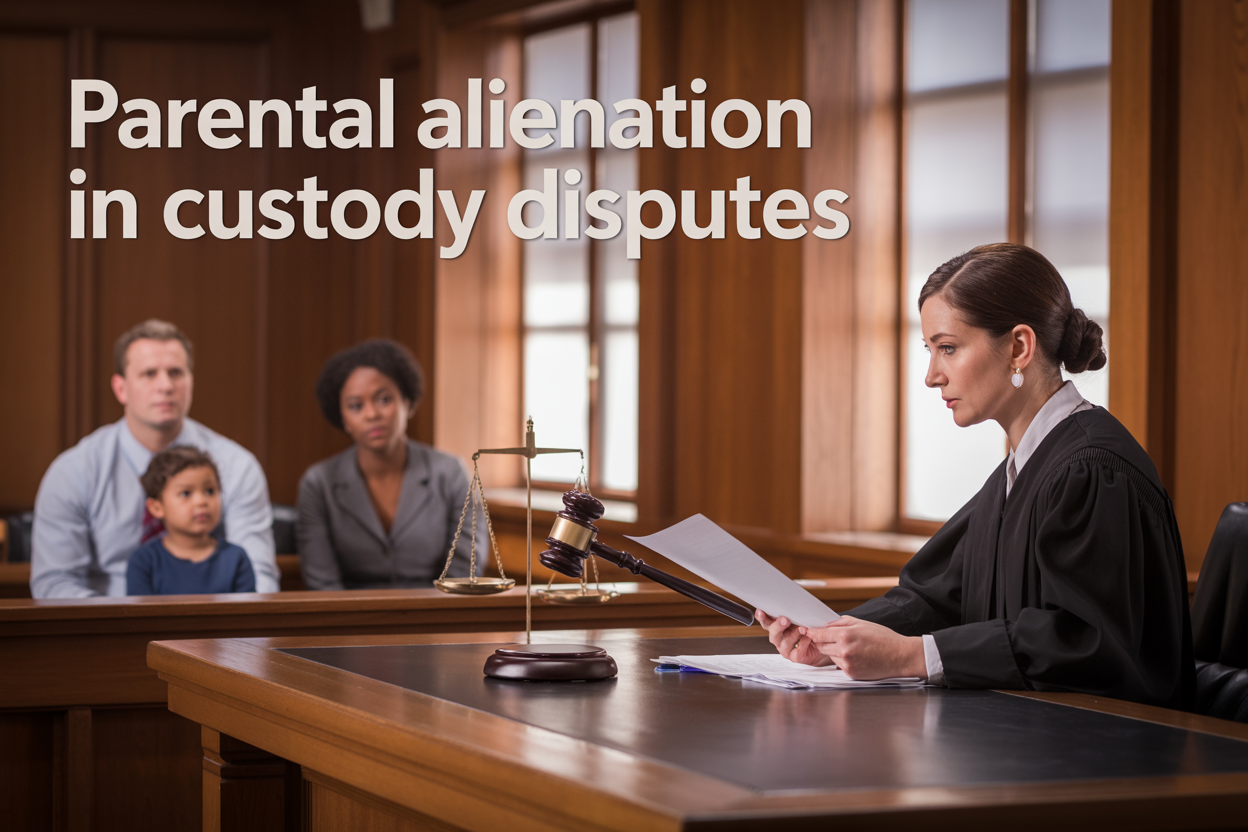When custody battles turn toxic, parental alienation can destroy the relationship between a child and one parent forever. This manipulative behavior has become a significant concern in family court judges’ decisions, and understanding what courts look for can make or break your case.
This guide is for parents, family law attorneys, and anyone involved in child custody court proceedings who needs to recognize and address alienation tactics. Whether you’re being falsely accused or genuinely witnessing alienating parent behavior, knowing how the legal system responds is crucial.
We’ll explore the warning signs that trigger red flags during custody disputes and walk through the custody evaluation process that determines outcomes. You’ll learn what parental alienation evidence actually holds up in court and discover the protective custody orders and remedies judges use to safeguard children from ongoing manipulation.
Understanding Parental Alienation and Its Impact on Custody Cases
Defining parental alienation and its behavioral patterns
Parental alienation occurs when one parent systematically undermines the child’s relationship with the other parent through manipulative tactics and psychological coercion. This destructive pattern goes far beyond typical post-divorce tensions, involving deliberate attempts to turn children against their other parent.
Alienating parent behavior typically includes badmouthing the other parent in front of children, sharing inappropriate details about divorce proceedings, and creating scenarios where children feel forced to choose sides. Common tactics involve scheduling fun activities during the other parent’s visitation time, making false accusations of abuse, or telling children that the other parent doesn’t love them anymore. Some alienating parents even go as far as intercepting phone calls, hiding mail, or moving away without notice to limit contact.
The alienating parent often presents themselves as the victim while portraying the targeted parent as dangerous, uncaring, or incompetent. They may use subtle manipulation, like sighing heavily when children mention enjoying time with their other parent, or they might be more direct by forbidding any mention of that parent in their home.
Distinguishing between usual preference and alienation
Children naturally develop preferences and may resist spending time with one parent over another for legitimate reasons. Normal preferences stem from genuine experiences – maybe one parent is stricter about bedtime, or another allows more screen time. These preferences are typically mild and don’t involve complete rejection of a parent.
Parental alienation syndrome, however, creates an intense, irrational hatred that doesn’t match the child’s actual experiences. Alienated children often use adult language when describing their feelings, parroting phrases they couldn’t have developed independently. They may refuse all contact with the targeted parent, showing no ambivalence about their rejection.
The key difference lies in flexibility and reasoning. A child with normal preferences can usually explain their feelings in age-appropriate terms and may still show affection for both parents in different situations. Alienated children demonstrate rigid, black-and-white thinking with no capacity for nuanced feelings about the rejected parent.
Recognizing the psychological damage to children
Custody evaluation process experts consistently find that parental alienation creates severe psychological trauma for children. These children often develop anxiety disorders, depression, and difficulty forming healthy relationships later in life. They learn that love is conditional and that manipulation is an acceptable way to handle conflict.
Alienated children frequently struggle with guilt and confusion, knowing on some level that their intense hatred doesn’t match their memories. This internal conflict can lead to behavioral problems, academic difficulties, and emotional dysregulation. Many develop a distorted sense of reality where they can’t distinguish between their own feelings and those implanted by the alienating parent.
The damage extends beyond childhood, with many alienated children growing up to have troubled relationships with both parents. They may eventually recognize the manipulation but struggle to repair the lost relationship with the targeted parent.
Examining how alienation affects custody outcomes
Family court judges take parental alienation seriously because it directly undermines the child’s best interests. Courts recognize that children need healthy relationships with both parents when possible, and alienation represents a fundamental threat to this principle.
Child custody court proceedings involving alienation claims often result in significant modifications to custody arrangements. Judges may order immediate intervention, including therapy, supervised visitation, or, in severe cases, temporary removal of children from the alienating parent’s care.
Child custody modification frequently becomes necessary when alienation is proven. Courts may transfer primary custody to the targeted parent or implement protective custody orders that prevent the alienating parent from discussing court matters with children or making disparaging comments about the other parent.
The severity of court response often depends on how entrenched the alienation has become and the alienating parent’s willingness to change their behavior. Early intervention typically yields better outcomes than cases where alienation has been allowed to continue for extended periods.
Key Warning Signs Courts Monitor During Custody Proceedings
Identifying Deliberate Interference with Parent-Child Contact
Family court judges watch closely for patterns where one parent systematically blocks or sabotages the other parent’s time with their children. This interference goes beyond occasional scheduling conflicts or legitimate safety concerns. Courts look for repeated cancellations of visitation, sudden “emergencies” that prevent exchanges, or refusal to answer phone calls during the other parent’s designated contact time.
Judges pay particular attention to alienating parent behavior that includes making the child unavailable during court-ordered parenting time, scheduling competing activities during visitation periods, or creating elaborate excuses why exchanges can’t happen. Technology-based interference has become increasingly common, with courts monitoring cases where parents block phone numbers, restrict video calls, or prevent email communication between children and the non-custodial parent.
The timing of these disruptions often reveals deliberate intent. Courts notice when interference escalates around holidays, birthdays, or other significant events, suggesting calculated efforts to damage the parent-child relationship rather than genuine logistical challenges.
Spotting Systematic Undermining of the Other Parent’s Authority
Courts examine how one parent consistently works to diminish their co-parent’s role and authority in their children’s lives. This undermining appears through various tactics that judges have learned to recognize during custody evaluation processes.
Common patterns include making unilateral decisions about significant issues, such as healthcare, education, or extracurricular activities, without consulting the other parent. Courts watch for evidence where one parent repeatedly contradicts or overrules decisions made by the other parent, particularly in front of the children.
Judges also monitor how parents speak about each other during exchanges or in written communications. Systematic undermining often involves subtle but persistent criticism, questioning the other parent’s judgment, or suggesting they’re unreliable or incapable. Courts look for patterns where one parent positions themselves as the “real” parent while minimizing the other’s importance.
Financial undermining represents another red flag, such as refusing to provide necessary information about expenses, making major purchases without discussion, or claiming the other parent doesn’t contribute adequately to the child’s needs.
Recognizing Manipulation Tactics Used Against Children
Family court judges have become skilled at identifying sophisticated manipulation tactics that alienating parents use to turn children against their other parent. These tactics often appear subtle but create profound psychological pressure on children.
Courts watch for evidence of emotional manipulation, including making children feel guilty for enjoying time with the other parent, creating loyalty conflicts where children feel they must choose sides, or suggesting that loving both parents means betraying the alienating parent. Judges look for patterns where the other parent gives children inappropriate adult information about custody disputes, financial problems, or alleged wrongdoings.
Age-inappropriate responsibility represents another concerning pattern. Courts monitor cases where children are given roles as messengers, spies, or decision-makers about custody arrangements. This might involve asking children to report on what happens during visits, making them responsible for scheduling decisions, or placing them in positions where they must reject the other parent’s attempts at contact.
Judges also recognize more direct tactics, such as coaching children on what to say in court or during custody evaluations, promising rewards for rejecting the other parent, or threatening consequences if children express positive feelings about their time with the targeted parent.
Detecting False Allegations and Their Timing Patterns
Courts have developed sophisticated methods for identifying patterns in false allegations that coincide with custody proceedings. Judges pay close attention to when serious accusations emerge and how they align with custody disputes, parental alienation syndrome cases, and requests for custody modifications.
The timing often reveals the strategic nature of false allegations. Courts notice when abuse claims surface immediately after custody petitions are filed, when allegations escalate as court dates approach, or when new accusations emerge each time the accused parent seeks increased custody time. Judges examine whether allegations align with attempts to obtain protective custody orders or emergency custody modifications.
Content and consistency patterns also raise red flags. Courts look for accusations that lack specific details, stories that change between tellings, or allegations that contradict previous statements or medical records. Judges examine whether claims align with observed parent-child interactions or contradict the child’s behavior and demeanor during visits.
Professional documentation becomes crucial in these evaluations. Courts review medical records, school reports, and therapist notes to determine whether allegations match documented evidence or appear inconsistent with professional observations from neutral parties.
Observing Children’s Sudden Behavioral Changes Toward a Parent
Child custody court proceedings require judges to carefully observe unexplained shifts in children’s attitudes and behavior toward one parent. These changes often signal that parental alienation may be occurring, particularly when the shifts happen suddenly and without clear justification.
Courts monitor cases where children who previously had loving relationships with both parents suddenly express intense fear, hatred, or rejection toward one parent. Judges look for language that seems coached or inappropriate for the child’s age, such as using legal terminology or adult concepts to describe their feelings about a parent.
Behavioral inconsistencies provide important clues. Courts watch for children who express strong negative feelings about a parent but seem comfortable and happy during actual visits, or children whose stated preferences dramatically contradict their observed behavior. Judges pay attention when children can’t provide specific reasons for their rejection or give explanations that seem coached or disproportionate to any actual incidents.
The presence of absolute thinking patterns also concerns courts. When children describe one parent as completely good and the other as entirely bad, without acknowledging any positive qualities or normal human complexity, judges recognize this as a potential sign of manipulation rather than authentic feelings developed through natural experiences.
Legal Standards and Evidence Requirements for Proving Alienation
Meeting the burden of proof in alienation claims
Proving parental alienation in custody disputes requires meeting a higher evidentiary standard than many parents expect. Courts typically require clear and convincing evidence rather than just a preponderance of evidence, making these cases particularly challenging. The burden falls squarely on the accusing parent to demonstrate that the other parent’s actions have deliberately damaged the child’s relationship with them.
Family court judges look for patterns of behavior rather than isolated incidents. A single missed phone call or negative comment rarely constitutes alienation. Instead, courts need documented, consistent evidence showing systematic efforts to undermine the parent-child relationship. This includes tracking communication interference, recording instances of scheduling conflicts designed to limit contact, and documenting the child’s changing attitudes toward the targeted parent.
The evidence must directly link the alienating parent’s behavior to the child’s rejection. Courts won’t accept speculation or assumptions. Parents need concrete proof that shows cause and effect between specific actions and the child’s response. This connection becomes even more critical when considering that children naturally go through phases of preferring one parent over another.
Gathering admissible evidence of alienating behaviors
Successful parental alienation evidence requires meticulous documentation and proper collection methods. Courts accept various forms of evidence, but each must meet strict admissibility standards. Text messages, emails, and voicemails serve as robust evidence when they show deliberate interference with parenting time or attempts to poison the child against the other parent.
Digital communications need proper authentication and a chain of custody documentation. Screenshots alone often prove insufficient; parents must preserve original files with metadata intact. Phone records can verify blocked calls or demonstrate patterns of communication interference during scheduled parenting time.
Third-party witnesses provide crucial corroboration for alienation claims. Teachers, coaches, therapists, and family friends who observe changes in the child’s behavior or hear concerning statements can offer valuable testimony. These witnesses should document specific dates, times, and exact quotes when possible.
Video evidence requires careful consideration of privacy laws and consent requirements. Recording conversations with children often proves problematic, as courts prioritize child welfare over evidence gathering. However, documenting public behaviors or interactions during custody exchanges can provide compelling proof of alienating conduct.
Financial records sometimes reveal alienation tactics, particularly when one parent uses money to influence the child’s preferences. Credit card statements showing excessive gifts during the other parent’s scheduled time or payments for activities that conflict with established parenting schedules can support alienation claims.
Understanding expert witness testimony requirements
Expert witnesses play a pivotal role in parental alienation cases, but courts maintain strict qualification standards for these professionals. Mental health experts must demonstrate specific training in family dynamics, child psychology, and alienation assessment techniques. General therapy experience alone typically doesn’t qualify someone as an alienation expert.
Custody evaluation process experts often serve dual roles, both investigating the family situation and potentially testifying about their findings. These professionals must remain neutral throughout their assessment, focusing on observable behaviors rather than taking sides in the dispute. Their reports carry significant weight because they’ve had direct access to all family members.
Courts prefer experts who use scientifically validated assessment tools rather than relying solely on clinical impressions. Standardized testing instruments help establish objectivity and reduce bias in expert opinions. The expert’s methodology becomes just as important as their conclusions.
Expert testimony must address the specific legal standards for alienation in the jurisdiction. Different states have varying definitions and requirements for proving parental alienation syndrome or similar concepts. Experts need familiarity with local case law and legal precedents that affect their testimony.
The timing of expert involvement matters significantly. Early intervention assessments often provide more valuable insights than evaluations conducted after months or years of deteriorated relationships. Courts recognize that children’s attitudes can change rapidly, making contemporaneous expert observations more reliable than retrospective analysis.
Cross-examination preparation becomes essential for expert witnesses in alienation cases. Opposing counsel will challenge their qualifications, methodology, and conclusions. Experts must clearly explain complex psychological concepts in terms that judges and juries can understand while defending their professional opinions against scrutiny.
How Judges Evaluate and Respond to Alienation Claims
Assessing the credibility of alienation allegations
Family court judges face a complex challenge when evaluating parental alienation claims, as these accusations can be weaponized by genuinely abusive parents seeking to discredit protective measures. Courts scrutinize the timing and context of alienation allegations, often viewing with skepticism claims that emerge only after abuse allegations surface. Judges examine the accusing parent’s history, including any documented patterns of manipulation or false reporting.
The credibility assessment involves analyzing consistency in the parent’s narrative across different proceedings and interviews. Courts look for corroborating evidence beyond mere accusations, such as documented attempts to undermine the other parent’s relationship with the child through witnesses, communication records, or professional observations. Judges also consider whether the claiming parent has demonstrated their own willingness to support the child’s relationship with the other parent.
Weighing child testimony and preferences appropriately
When children express reluctance to spend time with one parent, judges must carefully distinguish between legitimate concerns and potential alienation influences. Courts recognize that children’s stated preferences can be compromised by ongoing parental alienation syndrome, making direct interviews challenging to interpret.
Experienced family court judges often conduct in-camera interviews with children, creating a safe space away from both parents to explore the child’s feelings. These conversations focus on understanding the specific reasons behind the child’s reluctance rather than simply accepting surface-level preferences. Judges pay attention to whether children use adult language or concepts beyond their developmental stage when describing their feelings about a parent.
The child’s age and maturity level significantly influence how much weight courts give to their expressed preferences. While older teenagers’ voices carry more weight in custody evaluation process decisions, judges remain vigilant about signs that these preferences stem from manipulation rather than genuine experiences.
Considering psychological evaluations and professional assessments
Mental health professionals play a crucial role in helping courts navigate complex parental alienation evidence. Custody evaluators, child psychologists, and forensic specialists provide objective assessments that can reveal patterns invisible to the court during brief hearings. These professionals conduct comprehensive interviews with all family members, observe parent-child interactions, and review historical records to identify behaviors that may be alienating to the child.
Courts particularly value evaluations that include psychological testing of all parties, as these assessments can reveal personality disorders or mental health issues that contribute to alienation dynamics. Professional recommendations often carry significant weight, especially when multiple experts reach similar conclusions about the family dynamics at play.
However, judges also recognize that not all mental health professionals are equally qualified to assess parental alienation cases. Courts tend to favor evaluators with specific training in high-conflict custody situations and experience recognizing the subtle signs of psychological manipulation.
Balancing alienation claims with legitimate protection concerns
The most challenging aspect of parental alienation in custody disputes involves distinguishing between protective parenting and alienating behaviors. Courts must carefully examine whether a parent’s concerns about abuse, neglect, or inappropriate behavior are genuine or represent attempts to justify alienation.
Judges look for patterns that help differentiate between these scenarios. Legitimate protection concerns typically involve specific, consistent allegations supported by evidence or professional observations. In contrast, alienation cases often feature vague, shifting accusations that lack corroboration and seem designed primarily to limit the other parent’s access.
Family court judges increasingly recognize that both dynamics can coexist within the same case. A parent might have legitimate safety concerns while simultaneously engaging in alienating behaviors, requiring courts to craft nuanced responses that address both issues. This balancing act often involves implementing graduated responses, such as supervised visitation that protects legitimate concerns while working to rebuild damaged parent-child relationships through therapeutic intervention.
Courts also consider the requesting parent’s willingness to participate in family therapy or co-parenting counseling as an indicator of their genuine commitment to the child’s best interests versus their desire to exclude the other parent entirely.
Protective Measures and Remedies Courts Implement
Ordering Supervised Visitation and Gradual Reintegration
When courts identify parental alienation, supervised visitation often becomes the first line of defense to protect the parent-child relationship. Family court judges typically order this measure when they determine that unsupervised contact might expose the child to further alienating behavior. The supervising party – whether a court-appointed supervisor, family member, or professional – monitors interactions to ensure the child’s emotional safety while maintaining contact with the targeted parent.
The gradual reintegration process begins with short, structured visits in neutral settings. Courts design these sessions to rebuild trust and allow the child to reconnect without pressure from the alienating parent. As the relationship stabilizes, judges may expand visitation time and eventually remove supervision requirements. This step-by-step approach helps counteract the psychological damage caused by parental alienation while giving the child time to adjust.
Mandating Family Therapy and Co-Parenting Counseling
Courts recognize that parental alienation often stems from deeper family dysfunction requiring professional intervention. Judges routinely order family therapy sessions involving all parties to address the underlying issues driving alienating behavior. These therapeutic interventions focus on helping children develop healthy relationships with both parents while teaching the alienating parent to recognize and modify their harmful actions.
Co-parenting counseling becomes essential when dealing with high-conflict custody disputes involving alienation. Mental health professionals work with both parents to establish healthier communication patterns and develop strategies for putting their child’s needs first. Courts may require therapists to submit regular progress reports to monitor the compliance and effectiveness of these interventions.
Modifying Custody Arrangements to Prevent Further Alienation
When standard remedies fail to stop alienating behavior, courts may implement dramatic custody modifications. This can include transferring primary custody from the alienating parent to the targeted parent, especially when the child’s psychological well-being is at serious risk. Such decisions represent some of the most challenging choices family court judges face, as they must balance protecting the parent-child relationship against potentially traumatic changes in the child’s living situation.
Courts also create detailed parenting plans with specific provisions designed to prevent future alienation. These may include restrictions on negative commentary about the other parent, requirements for neutral drop-off locations, and detailed communication protocols. Some judges implement “no disparagement” clauses with clear consequences for violations.
Imposing Sanctions and Consequences for Alienating Behavior
Family courts possess various enforcement tools to address continued alienating behavior. Contempt of court charges represent one of the most serious sanctions available when parents violate custody orders or engage in prohibited conduct. These charges can result in fines, community service, or even jail time, sending a clear message that alienating behavior won’t be tolerated.
Courts may also impose financial consequences, requiring the alienating parent to pay attorney fees, therapy costs, or other expenses related to addressing the alienation. Some judges order makeup visitation time to compensate for periods when the alienating parent interfered with the relationship. In extreme cases, courts might temporarily suspend the alienating parent’s visitation rights until they demonstrate a genuine commitment to supporting their child’s relationship with the other parent.
Protective custody orders serve as another judicial tool, specifically prohibiting certain behaviors while outlining clear consequences for violations. These orders create enforceable boundaries that help prevent further damage to the parent-child relationship while the court works toward long-term solutions.
Courts take parental alienation seriously because they see how it damages children and disrupts healthy parent-child relationships. When judges spot warning signs like a child suddenly refusing contact with one parent or parroting adult language about complex legal issues, they dig deeper. They look for solid evidence and patterns of behavior rather than isolated incidents, knowing that false accusations can be just as harmful as actual alienation.
If you’re dealing with a custody dispute where alienation might be happening, document everything and work with experienced family law professionals who understand these complex dynamics. Remember that courts want what’s best for your child, which means preserving meaningful relationships with both parents whenever possible. Stay focused on your child’s well-being rather than winning against your ex-partner, and be prepared to show the court that you support your child’s relationship with the other parent.
At Lass Law, our Divorce & Family Law Attorneys in North County San Diego are dedicated to helping clients find stability and solutions during challenging times. Whether you’re working with a Family Law Attorney in Oceanside, addressing issues under Divorce Law, or seeking guidance from a Family Law Attorney in Vista, we provide personalized strategies for your unique situation. Learn more through our comprehensive Family Law services.






